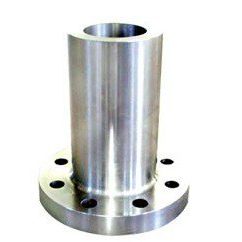In the field of industrial piping systems, integral flanges play a vital role in ensuring operational safety and efficiency. But what exactly is an integral flange? How does it work? In this blog, we will explore the details of the integral flange and better understand its function.
Integral flanges are components welded to piping systems to provide a secure, leak-proof connection. It is designed to withstand high pressure and high temperature conditions, making it an important component in many industrial applications. Integral flanges are typically made from the same material as the piping system, ensuring compatibility and strength of the connection.

So, how does the integral flange work? The key to its functionality lies in its design and construction. The flange is welded to the end of the pipe, creating a strong and permanent bond. This bonding not only provides a strong connection, but also prevents any potential leaks, ensuring the integrity of the duct system.
One of the main benefits of using integral flanges is their ability to disperse the stresses and pressures exerted on the piping system. When a system is under high pressure, flanges help distribute forces evenly across the connection, reducing the risk of failure or damage. This is crucial to ensure the security and reliability of the entire system.
Integral flanges also play an important role in facilitating the installation and maintenance of piping systems. They make it easier to connect and disconnect different components of a system by providing secure and standardized connection points. Not only does this save time and effort, it also minimizes the risk of errors during installation or maintenance.
In addition to their functional benefits, integral flanges are critical to ensuring the overall efficiency of your piping system. Their leak-proof design and ability to handle high-pressure and high-temperature conditions make them indispensable in industries such as oil and gas, petrochemicals and power generation. Integral flanges help critical processes and equipment run smoothly by providing reliable and durable connections.
It is important to note that the correct selection and installation of integral flanges is critical to their effective performance. Factors such as material compatibility, pressure ratings, and welding procedures must be carefully considered to ensure the integrity of the connection. Additionally, regular inspection and maintenance of integral flanges is essential to identify any potential problems and prevent any unforeseen failures.
In short, the integral flange is an integral part of the industrial piping system and plays a vital role in ensuring the safety, reliability and efficiency of operation. Their ability to provide secure, leak-proof connections, disperse stress and pressure, and facilitate installation and maintenance makes them indispensable in a wide range of applications. By understanding how integral flanges work and their importance in piping systems, industry professionals can make informed decisions to ensure optimal performance of their systems.
Post time: Feb-26-2024



